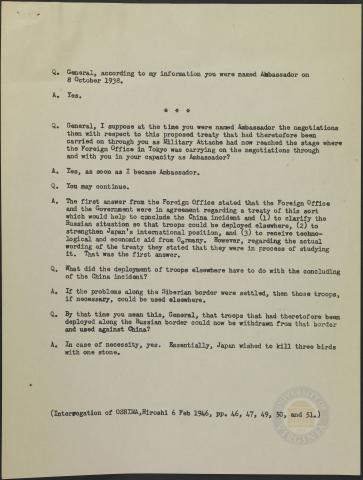
Page 3
| Parent | Request Form Accused - Incident: Excerpt from Interrogation of OSHIMA, Hiroshi, 6 February 1946, pp. 46, 47, 49, 50 and 51 |
|---|---|
| Date | 12 June 1946 |
| Language | English |
| Collection | Tavenner Papers & IMTFE Official Records |
| Box | Box 3 |
| Folder | General Reports and Memoranda from June 1946 |
| Repository | University of Virginia Law Library |
Q. General, according to my information you were named Ambassador on 8 October 1938.
A. Yes.
* * *
Q. General, I suppose at the time you were named Ambassador the negotiations then with respect t6o this proposed treaty that had theretofore been carried on through you as Military Attache had now reached the stage where the Foreign Office in Tokyo was carrying on the negotiations through and with you in your capacity as Ambassador?
A. Yes, as soon as I became Ambassador.
Q. You may continue.
A. The first answer from the Foreign Office stated that the Foreign Office and the Government were in agreement regarding a treaty of this sort which would help to conclude the China incident and (1) to clarify the Russian situation so that troops could be deployed elsewhere, (2) to strengthen Japan’s international position, and (3) to receive technological and economic aid from Germany. However, regarding the actual wording of the treaty they stated that they were in process of studying it. That was the first answer.
Q. What did the deployment of troops elsewhere have to do with the concluding of the China incident?
A. If the problems along the Siberian border were settled, then those troops, if necessary, could be used elsewhere.
Q. By that time you mean this, General, that troops that had theretofore been deployed along the Russian border could now be withdrawn from that border and used against China?
A. In case of necessity, yes. Essentially, Japan wished to kill three birds with one stone.
(Interrogation of OSHIMA, Hiroshi 6 Feb 1946, pp. 46, 47, 49, 50 and 51.)
